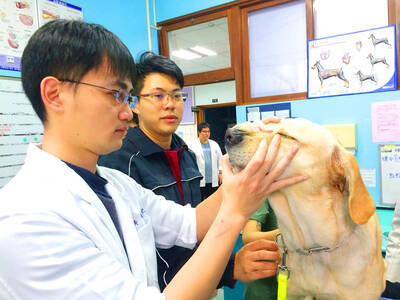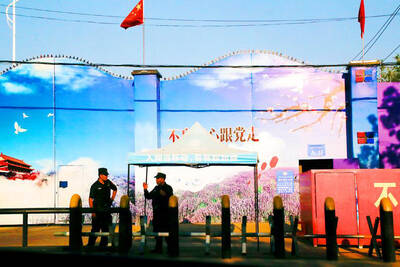Taiwanese director Huang Hsin-yao’s (黃信堯) comedy drama Classmates Minus (同學麥娜絲) won the Audience Choice Award, a non-competitive category of the Golden Horse Awards, at a ceremony in Taipei on Friday night.
The ceremony, held at the Mandarin Oriental Taipei, took place a day ahead of the 57th Golden Horse Awards, widely considered the Oscars of Chinese-language movies.
The 122-minute movie, shot in color and in black and white, is a drama set in Taiwan about four high-school classmates who are led by a series of events to ponder their lives, their aspirations and their destinies.
The film follows the four as they take on careers — a director, a white-collar worker, a part-time office worker and a ghost money maker — and struggle through marriage and middle-age, and have their friendships put to the test, while putting society and human nature under a magnifying glass.
“I am very surprised,” Huang said. “The win shows that the film resonates with audiences around northern, central and southern [Taiwan].”
The International Federation of Film Critics (FIPRESCI, short for Federation Internationale de la Presse Cinematographique) is an association of professional film critics and film journalists.
Malaysian director Chong Keat-aun (張吉安) was nominated for the Taipei Golden Horse Film Festival’s FIPRESCI Prize for his feature debut The Story of Southern Islet (南巫).
The movie is about a Chinese couple who lives near the Malaysia-Thailand border. After the husband quarrels with a neighbor, he vomits blood and a rusty nail, and passes out. Desperate to find a treatment for her husband, the wife begins to explore the different spiritual beliefs held by the ethnic groups in the region, hoping that one of them can heal her husband.
The jury citation said: “This is a fascinating debut, a well-crafted cinematic journey filled with surreal images and enchanting atmosphere. The director slowly envelops the viewers with mesmerizing scenes full of mystery, strong visual sense and the portrait of a community, showing great conviction to tradition and to local culture.”
Chong said that he was satisfied just to be nominated.
“I think that in being nominated, I have already won the prize,” Chong said.
The 57th Golden Horse Awards ceremony — a physical event in a year hit by COVID-19 — took place yesterday evening at the National Sun Yat-sen Memorial Hall in Taipei.
Forty nominated films competed for awards in 23 categories, said Wen Tien-hsiang (聞天祥), chief executive officer of the Taipei Golden Horse Film Festival’s Executive Committee, adding that 465 entries were submitted this year, down from last year’s 588 entries.
Wen did not offer a reason.
China has boycotted the awards to express its dissatisfaction with an incident at the 2018 Golden Horse Awards ceremony, when Taiwanese director Fu Yu (傅榆) in her acceptance speech for Best Documentary called for Taiwan to be treated as an “independent entity.”
Last year’s entries were submitted before the Chinese ban was imposed, Wen said, adding that there were still about 100 entries from China this year.

Former Czech Republic-based Taiwanese researcher Cheng Yu-chin (鄭宇欽) has been sentenced to seven years in prison on espionage-related charges, China’s Ministry of State Security announced yesterday. China said Cheng was a spy for Taiwan who “masqueraded as a professor” and that he was previously an assistant to former Cabinet secretary-general Cho Jung-tai (卓榮泰). President-elect William Lai (賴清德) on Wednesday last week announced Cho would be his premier when Lai is inaugurated next month. Today is China’s “National Security Education Day.” The Chinese ministry yesterday released a video online showing arrests over the past 10 years of people alleged to be

THE HAWAII FACTOR: While a 1965 opinion said an attack on Hawaii would not trigger Article 5, the text of the treaty suggests the state is covered, the report says NATO could be drawn into a conflict in the Taiwan Strait if Chinese forces attacked the US mainland or Hawaii, a NATO Defense College report published on Monday says. The report, written by James Lee, an assistant research fellow at Academia Sinica’s Institute of European and American Studies, states that under certain conditions a Taiwan contingency could trigger Article 5 of NATO, under which an attack against any member of the alliance is considered an attack against all members, necessitating a response. Article 6 of the North Atlantic Treaty specifies that an armed attack in the territory of any member in Europe,

LIKE FAMILY: People now treat dogs and cats as family members. They receive the same medical treatments and tests as humans do, a veterinary association official said The number of pet dogs and cats in Taiwan has officially outnumbered the number of human newborns last year, data from the Ministry of Agriculture’s pet registration information system showed. As of last year, Taiwan had 94,544 registered pet dogs and 137,652 pet cats, the data showed. By contrast, 135,571 babies were born last year. Demand for medical care for pet animals has also risen. As of Feb. 29, there were 5,773 veterinarians in Taiwan, 3,993 of whom were for pet animals, statistics from the Animal and Plant Health Inspection Agency showed. In 2022, the nation had 3,077 pediatricians. As of last

XINJIANG: Officials are conducting a report into amending an existing law or to enact a special law to prohibit goods using forced labor Taiwan is mulling an amendment prohibiting the importation of goods using forced labor, similar to the Uyghur Forced Labor Prevention Act (UFLPA) passed by the US Congress in 2021 that imposed limits on goods produced using forced labor in China’s Xinjiang region. A government official who wished to remain anonymous said yesterday that as the US customs law explicitly prohibits the importation of goods made using forced labor, in 2021 it passed the specialized UFLPA to limit the importation of cotton and other goods from China’s Xinjiang Uyghur region. Taiwan does not have the legal basis to prohibit the importation of goods